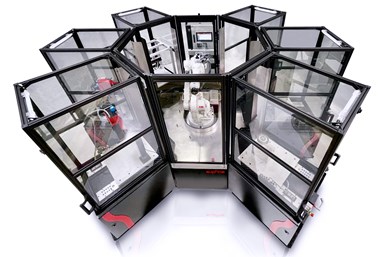Supfina's Modular Cell Extends Robotic Process Flexibility
Supfina’s Modular Cell enables swift change-over times and significant process flexibility, allowing high-mix shops to benefit from automation.
Share






Supfina Machine Company Inc. has announced its Modular Cell, a highly customizable system that provides end-users the ability to integrate up to seven operations to create a unique automated robotic cell. The cell can be a stand-alone system, or can integrate within an entire production suite. The Modular Cell is the newest addition to Supfina’s family of products, which focus on flat finishing, fine grinding, superfinishing, and double disk grinding.
Operations within the Modular Cell are fully customizable and are capable of including dozens of individual processes in abrasive machining, assembly, automation, conventional machining, post-machining and secondary operations across a wide variety of industries.
The Modular Cell also includes a proprietary locking mechanism, allowing users to change specific modules in minutes. This flexibility improves changeover time, ease of installation and maintenance accessibility. When an end user implements a new program on their floor, updating requires only adding a new module to an existing cell, allowing for the quick retooling high-mix manufacturers need.
Software within the Modular Cell promotes machine learning and predictive analytics, while also enabling cloud data storage. When using the Modular Cell with multiple workpieces, the system determines the current workpiece and utilizes the correct modules for the given part. The ability to run different workpieces in parallel also provides higher throughput while maintaining a limited factory footprint. These process and connectivity improvements reduce downtime to improve timely delivery of spare parts and expedite mechanical assistance.
Related Content
-
CNC Machine Shop Honored for Automation, Machine Monitoring
From cobots to machine monitoring, this Top Shop honoree shows that machining technology is about more than the machine tool.
-
5 Stages of a Closed-Loop CNC Machining Cell
Controlling variability in a closed-loop manufacturing process requires inspection data collected before, during and immediately after machining — and a means to act on that data in real time. Here’s one system that accomplishes this.
-
Same Headcount, Double the Sales: Successful Job Shop Automation
Doubling sales requires more than just robots. Pro Products’ staff works in tandem with robots, performing inspection and other value-added activities.













